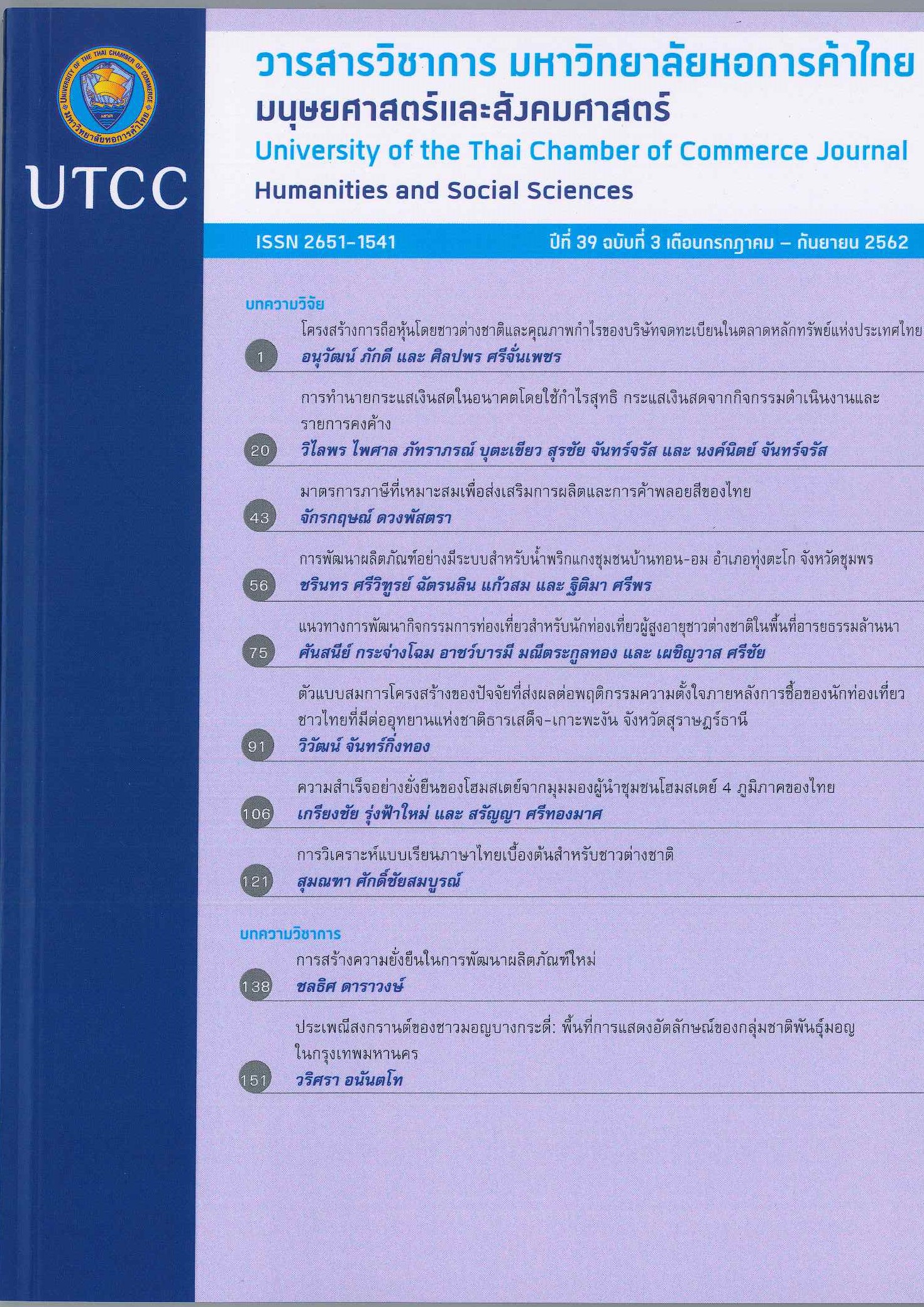Sustainable Success of Homestay from the Perspectives of Homestay Community Leaders in Four Regions of Thailand
Main Article Content
Abstract
This paper aimed to investigate sustainable approaches of a successful homestay business from community leaders’ perspectives in four regions of Thailand. For this purpose, in-depth interviews were conducted with four selected leaders of four homestays from that four regions. They were 1) Bahn Ta Khun Thong Homestay, Chiang Rai Province; 2) Sai Noi Homestay, Ayutthaya Province; 3) Kao Yao Noi Homestay, Phang Nga Province; and 4) Bann Prasard Homestay, Nakhorn Ratchasima Province. The findings indicated that there were seven sustainable approaches of the successful homestay business in Thailand: 1) community participation and community unity, 2) efficient management of the community, 3) capable community leaders, 4) quality standards of the accommodation 5) local identity products and service, 6) external support organizations, and 7) marketing and public relations.
Article Details
ลิขสิทธิ์ของบทความ
ผลงานที่ได้รับการตีพิมพ์ถือเป็นลิขสิทธิ์ของมหาวิทยาลัยหอการค้าไทย ห้ามมิให้นำเนื้อหา ทัศนะ หรือข้อคิดเห็นใด ๆ ของผลงานไปทำซ้ำ ดัดแปลง หรือเผยแพร่ ไม่ว่าทั้งหมดหรือบางส่วนโดยไม่ได้รับอนุญาตเป็นลายลักษณ์อักษรจากมหาวิทยาลัยหอการค้าไทยก่อน
References
กรมการท่องเที่ยว. (2558). มาตรฐานโฮมสเตย์ไทย. กรุงเทพฯ: ผู้แต่ง.
ทวีศักดิ์ นพเกษร. (2551). วิธีการวิจัยเชิงคุณภาพ. นครราชสีมา: มหาวิทยาลัยนเรศวร.
ประเวศ วะสี. (2555). ปาฐกถาพิเศษ ของนายแพทย์ประเวศ วะสี ในหัวข้อ “ชุมชนท่องเที่ยวตามวิถีพอเพียง”. สืบค้นเมื่อ 10 มีนาคม 2561, จาก
http://www.dasta.or.th/th/component/k2/item/482
พจนา สวนศรี. (2560). การท่องเที่ยวโดยชุมชน. รายงานภาวะเศรษฐกิจการท่องเที่ยว, 7, 60-67. สืบค้นจาก https://www.mots.go.th/ewt_dl_link.php?nid=8404
สถานการณ์การท่องเที่ยวของไทยที่สำคัญ. (2560). รายงานภาวะเศรษฐกิจการท่องเที่ยว, 7, 10-17. สืบค้นจาก https://www.mots.go.th/ewt_dl_link.php?nid=8404
สถาบันการท่องเที่ยวโดยชุมชน. (ม.ป.ป.). สืบค้นเมื่อ 6 มิถุนายน 2559, จาก
http://www.cbt-i.org/?ge=show_pages&gen_lang=20112012094103#.V1kg8ZyLTcs
สำนักงานพัฒนาการท่องเที่ยว, สำนักพัฒนาแหล่งท่องเที่ยว. (2550). คู่มือเครือข่ายการท่องเที่ยวโดยชุมชน. กรุงเทพฯ: ผู้แต่ง.
Braun, V., & Clarke, V. (2006). Using thematic analysis in psychology. Qualitative Research in Psychology, 3(2), 77-101.
Creswell, J. W. (2014). Research design: Qualitative, quantitative, and mixed methods approaches. London, England: Sage.
Kontogeorgopoulos, N., Churyen, A., & Duangsaeng, V. (2015). Homestay tourism and the commercialization of the rural home in Thailand. Asia Pacific Journal of Tourism Research, 20(1), 29-50.
Nunkoo, R., & Gursoy, D. (2016). Rethinking the role of power and trust in tourism planning. Journal of Hospitality Marketing & Management, 25(4), 512-522.
Reed, M. G. (1997). Power relations and community-based tourism planning. Annals of Tourism Research, 24(3), 566-591.


